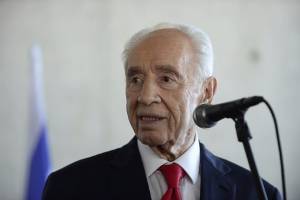
Former President Shimon Peres. (Tomer Neuberg/Flash90)
An Israeli initiative is using social media to bridge gaps between Jews and Arabs in Israeli society, starting with the young generation.
A unique program in Israeli schools is bringing Jewish and Arab students together by applying technology to break down barriers. Incorporated so far in 14 schools, former Israeli President Shimon Peres is leading an effort to bring the program to all Israeli schools.
The program, called “Hanging Out for Peace,” is in its third year and was initiated by ORT School Network, the Peres Center for Peace and Google Israel. This year, over 1,000 students from around the country, both male and female, will participate, with an equal number of Jews and Arabs.
“It’s hard to break barriers when meeting face to face because of stereotypes that prevent sincere discussion,” Efrat Duvdevani, director-general of the Peres Peace Center, told Tazpit. “That’s why the initial interaction is done via video-chat, which is more in the teenagers’ comfort zone.”
“I’m sure this project will create much-needed dialogue and friendships between people who, despite their physical proximity and shared interests, rarely interact,” added Duvdevani.
During the program, each Jewish participant is matched with a Muslim, Druze or Bedouin student. The participants first talk via Google Hangouts video-chat sessions before eventually meeting in person. Students who participated in the program last year strongly recommend the experience.
‘I Discovered How Much We Have in Common’
“I was afraid at first because I’d never had any contact with Jewish students before, but when the program began, it became easier. When we worked together I discovered how much we have in common,” said Rana Zoabi, a student at the Arab ORT Bustan al-Marj High School.
“The program gives us connections with people we don’t normally meet, I think it’s a huge prerogative,” said Dana Honen, another participant, from the Jewish ORT Binyamina High School. “The experience definitely changed my views. I understood that it’s possible to talk to them and that it’s fun to break down prejudice we have against them.”
Two months into the program, all the participants meet at the Peres Center, where they take leadership classes and work on joint projects. At the end of the year, the participants prepare a final event, such as a joint sports day or a cooking workshop in which Jewish students make Arab food and Arabs make Jewish food.
“I think it’s a very important program because peace begins with the young generation, and from them it can spread out to everywhere in the country,” said Zoabi.
Not everyone welcomes this sort of program. Honen, another participant, said that she got both positive and negative reactions. “My father was afraid at first and worried for me, but my mother was supportive,” she recalled. “People don’t like to change their views. They would change them had they participated in the program.”
Duvdevani said that the Peres Center is working with the Israeli Ministry of Education to make the program national and incorporate it into all Israeli schools. “We believe this could be a game changer for Israeli society,” she said.
Peres is leading the effort to make the program nationwide.
“To achieve real coexistence we need to bring science to everyone – Jews and Arabs,” said Peres. “The young generation is our future, and we should join hands with the government to get more Jewish and Arab students to meet together using advanced technology. Together we’ll make Israel a better place.”
By: Michael Bachner, Tazpit News Agency
Do You Love Israel? Make a Donation - Show Your Support!
Donate to vital charities that help protect Israeli citizens and inspire millions around the world to support Israel too!
Now more than ever, Israel needs your help to fight and win the war -- including on the battlefield of public opinion.
Antisemitism, anti-Israel bias and boycotts are out of control. Israel's enemies are inciting terror and violence against innocent Israelis and Jews around the world. Help us fight back!


